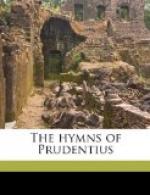"Christusque nobis sit cibus Potusque noster sit fides; Laeti bibamus sobriam Ebrietatem Spiritus."
Translation.
“May
Christ be now the Bread we eat,
Be
simple Faith our potion sweet:
Let
our intoxication be
The
Spirit’s calm sobriety.”
The idea is familiar to readers
of Herbert and Herrick, though it
is elaborated by them with quaint conceits somewhat
foreign to the
Latin poet. Cf. Herbert, The Banquet:—
“O what sweetnesse
from the bowl
Fills my soul!
* * * * *
Is some starre (fled from
the sphere)
Melted there,
As we sugar melt in wine?
* * * * *
Doubtless neither starre
nor flower
Hath the power
Such a sweetnesse to impart:
Only God, Who gives perfumes,
Flesh assumes,
And with it perfumed my heart.”
Also Herrick, A Thanksgiving to God:—
“Lord, I confess too,
when I dine,
The pulse is thine.
* * * * *
’Tis thou that crown’st
my glittering hearth
With guiltless mirth,
And giv’st me wassail bowls to drink,
Spiced to the brink.”
28 The original dactylico refers to the
metre of the Latin of this
poem. For a rendering
of ll. 1-65 in the metre of the original see
Glover, Life and
Letters in the Fourth Century, pp. 267-269.
58 This and the following lines should satisfy
the most ardent
vegetarian who seeks
to uphold his abstinence from animal food by
the customs of the early
Church. In Christian circles, however, the
abstinence was practised
on personal and spiritual grounds, e.g.,
Jerome (de Regul.
Monach., xi.) says, “The eating of flesh
is the
seed-plot of lust”
(seminarium libidinis): so also Augustine
(de
moribus Ecc. Cath.,
i. 33), who supports what doubtless was the
view of Prudentius,
namely that the avoidance of animal flesh was a
safe-guard but not a
binding Christian duty.
75 Unwed. Prudentius thus adopts the view
of the ancient world on
the question of the
generation of bees. Cf. Virgil, Geo.
iv. 198,
and Pliny, Nat.
Hist., xi. 16. Dryden’s translation
of Virgil
(l.c.) is as
follows:—
“But
(what’s more strange) their modest appetites,
Averse
from Venus, fly the nuptial rights;
No
lust enervates their heroic mind,
Nor
wastes their strength on wanton womankind,
But
in their mouths reside their genial powers,
They
gather children from the leaves and flowers.”
86 Cf. Ps. liv. 18, 19 (Vulg.): Vespere
et mane et meridie narrabo
et annuntiabo et exaudiet
vocem meam. “In the evening and morning
and at noonday will
I pray, and that instantly and he shall hear my
voice” (P.
B. Version).




